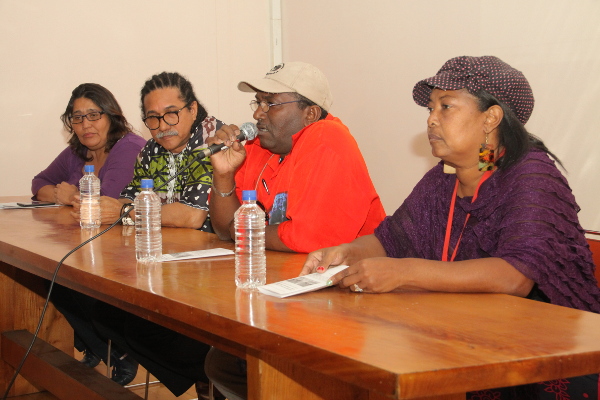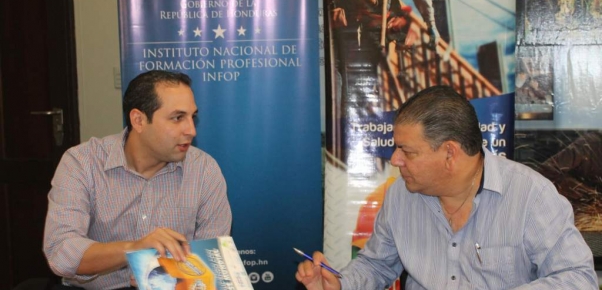
Afrovenezolanos rindieron homenaje al revolucionario, profesor universitario y pedagogo, Luis Antonio Bigott, quien falleció el pasado 26 de febrero
El movimiento afrovenezolano estableció ayer diversas mesas de trabajo con organizaciones populares y representantes de los ministerios del Poder Popular para la Educación y para la Cultura, a fin de exponer distintas experiencias sobre las prácticas culturales, interculturales y de Pedagogía Cimarrona, de cara a la transformación del currículum educativo.
Durante un conversatorio denominado ‘Coloquio, cultura, interculturalidad y pedagogía cimarrona’, efectuado en la sede del Instituto de Patrimonio Cultural, en Caño Amarillo, Caracas, el director de Interculturalidad del despacho para la Educación, Benjamín Martínez, afirmó que actualmente se desarrolla una revisión profunda y compleja del currículum educativo.
Afirmó, en ese sentido, que deben crearse políticas para impulsar la práctica de la Pedagogía Cimarrona.
“Lo más importante es la descolonización de lo saberes y haceres. Sin transversalizar eso en el currículum educativo no hacemos nada”, subrayó durante el homenaje al profesor universitario e investigador Luis Antonio Bigott, quien falleció el pasado 26 de febrero, hombre ilustre con una amplia trayectoria profesional, siempre firme en su compromiso con la pedagogía crítica, la educación popular, la emancipación del pensamiento y la transformación de la educación universitaria nuestramericana.
Martínez reconoció, además, que el currículum educativo actual tiene sus limitaciones: sigue siendo occidental.
“He allí la importancia de una categoría que es la Afroepistemología, reflexionada durante muchos años por el profesor Luis Chucho García . No hay un concepto que englobe la diversidad de los pueblos africanos, ni las luchas de los cimarrones y de las cimarronas, quienes protagonizaron diversas formas pedagógicas propias para la reconstrucción de sus idiomas. Los separaron para que no se pudieran comunicar. Por eso este esfuerzo por impulsar la espiritualidad”, reflexionó.
Por su parte, la directora general de Interculturalidad de Min-Cultura, Kelly Potella, ratificó el apoyo a las propuestas del movimiento afrovenezolano, a través de diversas de diversos organismos como el Centro Nacional del Disco (Cendis) y la Fundación Editorial El Perro y la Rana, entre otros entes.
El profesor universitario y escritor Luis Chucho García instó a las autoridades a generar un documento de trabajo junto al Poder Popular, para impulsar líneas de trabajo concretas.
Al mismo tiempo, insistió en la necesidad de reconocer el carácter autónomo de los movimientos sociales. En ese sentido, citó un adagio del pueblo Fon: ‘Si no nosotros no entramos en un juego, otros están jugando por nosotros’.
“Es importante el tema del conocimiento. Si nosotros no tenemos un conocimiento desde adentro (…) nuestras luchas no van a tener sentido”, argumentó.
El proyecto de la pedagogía cimarrona plantea la elaboración de la biblioteca afrovenezolana
PROYECTO CIMARRÓN
El proyecto de la Pedagogía Cimarrona plantea la elaboración de la Biblioteca Afrovenezolana, en el contexto del Decenio de los Pueblos Afrodescendientes (2015 – 2024), aprobado por la Organización de las Naciones Unidas, bajo los principios de justicia, reconocimiento y desarrollo.
La biblioteca estará dirigida en tres instancias: 1) La publicación de textos referenciales sobre la afrovenezolanidad, para las y los docentes 2) La publicación de texto escolares para los alumnos en las diferentes modalidades 3) La publicación de materiales didácticos, así como vides, calendarios, juegos entre otros.
Durante el conversatorio, los especialistas hicieron sugerencias para la puesta en práctica de la cultura, la interculturalidad y el patrimonio cultural de la afrovenezolanidad en el sistema educativo. Igualmente, conversaron sobre las distintas experiencias de las prácticas culturales, interculturales de la pedagogía cimarrona.

Benjamín Martínez: «Lo más importante es la descolonización de los saberes y haceres»
CULTURA, INTERCULTURALIDAD Y PEDAGOGÍA CIMARRONA
Cultura, interculturalidad y Pedagogía Cimarrona son tres segmentos totalmente articulados para la comprensión de la afrovenezolanidad, no solo en el sistema educativo bolivariano formal, sino en el contexto social comunitario que trasciende la territorialidad afrovenezolana.
Las experiencias de la defensa del patrimonio cultural venezolano en el medio educativo se ha venido realizando desde que las y los africanos fueron secuestrados y traídos como esclavizados a estas tierras.
La actividad fue organizada por el Instituto de Patrimonio Cultural; la Fundación Afroamericana; la Diáspora Africana; el Movimiento Afrorevolucionario Juan Ramón Lugo; la Red de Organizaciones Afrovenezolana y la Red de Afrodescendientes de Venezuela.
Foto/Héctor Rattia
Caracas















 Users Today : 5
Users Today : 5 Total Users : 35460462
Total Users : 35460462 Views Today : 5
Views Today : 5 Total views : 3419300
Total views : 3419300